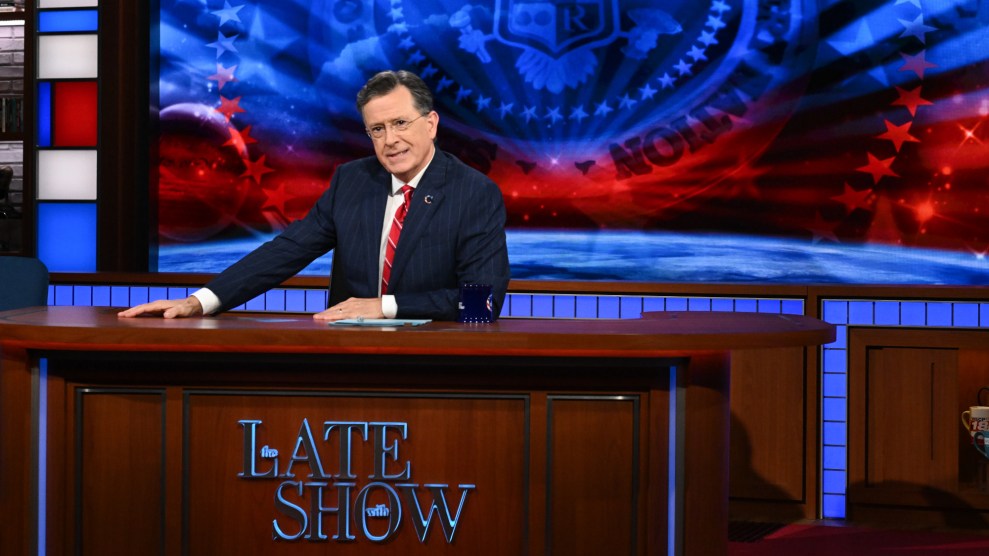Mother Jones: Why do you support withdrawal?
George McGovern: Because we made a mistake in invading in the first place. That war has no logic to it. The president told the VFW a week or so ago that we were there because we were attacked on 9/11, but the Iraqis had nothing to do with 9/11. The president had to know that. So he compounds a falsehood by deliberately passing out false information.
MJ: Do you feel as though there’s any obligation now that we have invaded Iraq to prop up the country and the Maliki government by staying militarily?
GM: Not militarily. I think the quicker we get out militarily the better. Professor Polk, my coauthor [on the book Out of Iraq], and I’ve suggested a six-month withdrawal period but during that time and for a year and a half after the six-month withdrawal period we would encourage the Iraqis to invite in law enforcement personnel from other Muslim or Arab countries and we would offer to pay for that.
MJ: By “we” you mean the United States?
GM: Yeah. It would just be the equivalent of just a few days of staying in the war in terms of the cost. The war costs us $250 million a day. A billion dollars goes down the drain every four days. We could finance a peacekeeping force there for a tiny fraction of what it costs us to stay involved militarily.
MJ: The religious composition of the force is an interesting point. Who do you think should be in charge of it?
GM: I’d like to see the U.N. administer something of that kind, but if not, the Iraqis might seek cooperation and support of other Arab or Muslim states. The United States should do what we can but I think the quicker we withdraw militarily the quicker we will remove one of the sources of the insurgency, which is the resentment of foreign troops, namely American troops. We forget that one of the things that motivated the American Revolution was the presence of British troops. That wasn’t the only cause of the Revolution, but it was one cause, and I think it’s one cause that drives the insurgency in Iraq. There have been polls indicating that the overwhelming majority of the Iraqis do not see us as liberators; they see us as occupiers.
MJ: Did you receive acknowledgments from military sources that six months is a reasonable time for withdrawal?
GM: Well, the six months I suggested in my book has come and gone. We wanted to put that in place January 1, terminating at the end of June, this year. To be candid about it, no one really knows the correct time it would take to systematically withdraw our forces. It might be less than that; it might be more. But we thought that six months was a reasonable figure.
MJ: You mentioned the American Revolution. George Bush has made comparisons to Vietnam. What do you see is the best historical analogy for the situation that we’re in in Iraq right now?
GM: Vietnam. Vietnam. It is a classic case and we’re repeating a lot of the same things we did in Vietnam. First, we invaded a little country that was no threat to us. That was true in Vietnam that was true in Iraq. Second, we invaded a little far away country we knew very little about. We had very few people that could even speak Vietnamese and even fewer who could speak Arabic, so those two things were very strong. And thirdly, you’re dealing with problems that aren’t essentially military. Namely in the case of Vietnam, the revolution against French rule out there all those years. And in Iraq they never did anything to us militarily.
And so why apply a military solution to a problem that’s of a nonmilitary nature? Even terrorism—of which the Iraqis are not the worst example—the terrorist problem tends to be a nonmilitary problem. It grows out of anger, frustration, misrule, and mistreatment. A lot of things that are not going to be addressed by military avenues.
MJ: President Bush brought up the Vietnam analogy because he said that after we withdrew from Vietnam there was all sorts of bloodletting. People that had supported the Americans there were persecuted. He said that the same might happen in Iraq if we withdraw now. What are your thoughts on that comparison?
GM: Well there’s some truth in that. There will be some reprisals once we leave but it’s a tiny percentage of the death the Iraqis are suffering by continuing the war. I’m sure there will be continued friction between the Sunni and the Shiite and some problem with the Kurds, whether we stay or whether we withdraw.
But I think the suffering in Iraq is much greater continuing a war than it would be if we end it by coming home. The British journal Lancet, one of the leading medical journals, and Johns Hopkins University have both completed studies indicating that 600,000 Iraqis have been killed since we occupied their country. That’s staggering.
MJ: Critics of the Bush administration said in the wake of President Bush’s speech last week that the domino effect that was predicted after we left Vietnam never occurred. Communism did not sweep Southeast Asia. And the idea that President Bush is pushing, that our withdrawal from Iraq will allow terrorism to spread to the rest of the world is similarly facile. What are your thoughts on the long-term repercussions of withdrawal in terms of the safety of the United States and the globe?
GM: I don’t know what’s going to happen when the United States withdraws from Iraq, but I do know that our presence there for the last five years has greatly aggravated the terrorist problem. There’s more terrorism in Iraq today than there was five years ago when we sent our army in there. There’s more terrorism in the Middle East today than there was before we intervened in Iraq. So just as the domino theory was proved false in the case of Vietnam, I think a lot of these predictions of how horrible the world is going to be if we leave are equally illegitimate.
MJ: You mentioned reprisals. Does the United States have an obligation to help the Iraqi translators, the fixers, the drivers, and the other folks who coordinated with the United States occupation?
GM: No, I don’t think so. I think that if you took a poll of those people they’d probably say get out. The time has come to get out, come on home, and then do what we can to help rebuild that country within reason and with the cooperation of other countries.
MJ: Let’s talk for a little bit about the political situation in Iraq after the U.S. leaves. How do you think power will shift?
GM: The Iraqis will survive our departure. They’ve seen invading forces come and go over the centuries and they’ll find a way to make a go of it. There will continue to be friction between the Sunni and the Shiite—there always has been. They both probably have a certain amount of resentment toward the Kurds, who want out of the whole thing, want an independent country, but I think in some cases we have to give up the idea that we can control events. Controlling our own country for the better—that’s a tall order. Trying to dictate events in the Middle East or in other conflicted areas of the globe is probably beyond our capacity.
MJ: Some people, including Democrats, have said that if ethnic cleansing occurs after we leave we have a moral obligation to stop it. Do you agree with that?
GM: I think we have an obligation on genocide. That’s one type of war that I would support us bringing to a halt. I don’t believe there will be genocide in Iraq but we should keep that option open. Genocide is a horrible thing to happen to a country. That’s what Hitler was doing with the Jews in WWII and was one of the reasons I volunteered at the age of 19 to participate in that conflict. So I wouldn’t rule out a role for the U.S. in the event some genocidal campaign got under way.
MJ: So you would be open to intervening to stop genocide, to stop a worsening civil war between Sunnis and Shiites?
GM: I think we’ve got to stay out of these civil wars, but if it ever were to assume the character of genocide then I would hope the United States would go to the U.N. and seek an international response.
MJ: Are your feelings based on a fundamentally non-interventionist philosophy?
GM: I think you have to be awfully careful about intervening in some other country’s internal affairs. Genocide, as I’ve said, is an exception to that. Genocide is something that always calls for action. But these internal quarrels and conflicts, this ancient struggle between the Shiites and the Sunnis, we shouldn’t get involved in that.
MJ: Do you think Iraq’s neighbors will try to fill the power vacuum if the U.S. withdraws?
GM: I think they could be a force for good in helping to rebuild a brother state.
MJ: Do you think the U.S. will have to use diplomacy in order to urge them to be a force of good?
GM: I think we ought to do that, to encourage that.
MJ: The Iranians have said they will intervene on behalf of the Shiites and the Saudis have said they will intervene on behalf of the Sunnis. If either of those groups looks like they’re being persecuted, how do we make sure this doesn’t turn into a regional conflagration?
GM: I don’t know, but if these two countries take these diametrically opposed positions I don’t know if there’s much we can do. I would hope we would protest it but I don’t know that I’d want to see American forces trying to go in to discipline the Saudis or the Iranians. We’ve got to talk directly to those countries. We shouldn’t tell any country that they’re off-limits to diplomacy.
MJ: So you would be a critic of the Bush administration’s diplomatic approach of the last five years?
GM: Yes. I think just about everything they’ve done is wrong from the day they entered office.
MJ: You stated in your book you believe in reparations for Iraqis. This may be a silly question, but can you explain that? Not a lot of other people are vocal about this.
GM: We’ve done so much destruction there. To me it does create a moral problem when you destroy a country’s infrastructure as we have in Iraq. We’re worried about this bridge that came down in Minneapolis but we’ve knocked down practically all the major bridges in Iraq. The tunnels, the roadways, the electrical systems, the water system—and I think we have some obligation to help rebuild some of the things we’ve destroyed. I think it will do a lot to improve our position in the world.
MJ: Do you believe in reparations for individual Iraqi families in addition to paying for reconstruction projects?
GM: Yes, I would support that.
MJ: How would such a system work?
GM: Well, I would hope there would be a number of other countries that would join with us on that, but we should find some agency to administrate other than ourselves. I don’t think it would be a practical thing for an American commission, for example. I think it should be administered by some international agency, either one that’s committed for that purpose or as a function of the United Nations.
MJ: What happens to the prisoners in the United States’ detention centers? In the book you suggest releasing all “political captives” who are part of the insurgency. Do you think that that would present a danger to the Iraqi society we leave behind?
GM: No I don’t think it would present a danger. We always release prisoners at the end of a war. [At the end of] World War II, we released all of our prisoners and the Russians and the Germans, the French, everybody else all did the same thing. There’s no reason it should be any different in this war.
















